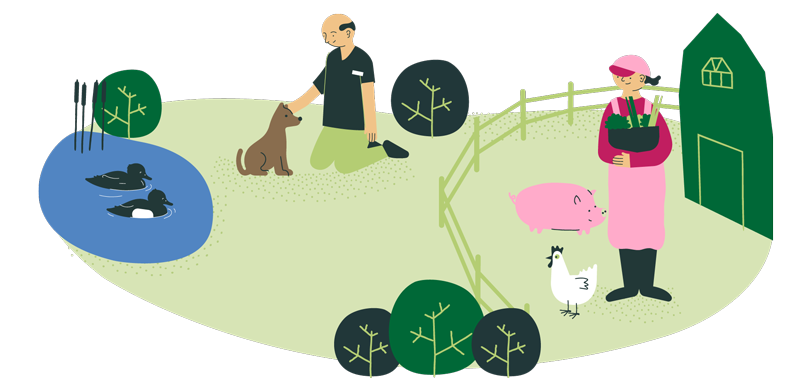Exploring Sweden’s Approach in Animal Health and Food
From an international prespective, levels of antibiotic resistance among bacteria in Swedish food producing animals are low, and notifiable resistant bacteria (e.g. MRSA) are uncommon in Swedish animals.

Vaccination, infectious disease control and monitoring programmes are of fundamental importance for preventing infections. The need for antibiotics in animals is reduced through efficient disease control, good farm management, biosecurity and sound animal husbandry.
Foundations in animal and food sectors
Cornerstones in the Swedish approach in the animal and food sector have been the ban on antibiotics for growth promoting purposes in 1986, a strong tradition of infectious disease control, strict regulations on animal welfare, and access to data on sales of antibiotics for animals. Close collaboration between academia, authorities and stakeholders has been vital for continuous improvement.
Prevent infections and spread of resistance
Sweden has a long tradition of control of infectious diseases in animals. Many infectious agents are notifiable in Sweden. Since 2008, certain types of resistance are also notifiable which allows for monitoring of trends and follow-up. Disease control programmes create incentives for the implementation of biosecurity measures at the farm level and in trade. Today, general biosecurity programmes are run by industry animal health service organisations. Preventing the spread of animal diseases and zoonotic pathogens also has an impact on food safety and the environment and therefore constitutes an important safeguard for human health.
Biosecurity programme for farm animals, in Swedish (smittsakra.se)
Advice on disease prevention is available through organised animal health services. Farmers regularly receive farm-specific advice on disease prevention on their own farm. These organisations provide a vital link between authorities and academia on one side, and practising veterinarians and farmers on the other.
Infection, prevention and control (IPC) is central, as well as good hygiene in animal health and care. In Sweden this is regulated by law.
Responsible use of antibiotics
Antibiotics for animals are only available on prescription and can only be sold by pharmacies. Guidance on prudent use of antibiotics in various animal species, based on evidence or expert consensus, is readily available to veterinary prescribers. Current regulations on the use of antibiotics are in line with the guidance on prudent use: antibiotics should only be used when needed and the risk of resistance should be considered when prescribing.
Recommendations for antibiotic use in animals:
- The Swedish Veterinary Association has a general antibiotics policy and animal specific guidelines
- Information from the Swedish Veterinary Agency in Swedish (sva.se)
Access to data and communication
Data on sales of antibiotics for animals has been available since 1980. After the ban on antibiotics for growth promotion, there was a strong focus on reducing the need to medicate groups of animals. The quality of prescribing has improved, and today most animals are treated individually. Additionally, narrow-spectrum penicillins are generally the most commonly prescribed antibiotics.
Surveillance of antibiotic sales for use in animals
More on Antibiotics and Animal Health from the Swedish Board of Agriculture (jordbruksverket.se)
Learn more
- "The Swedish experience" - a summary on the Swedish efforts towards a low and and prudent use of antibiotics in animal production Successful Prevention of Antimicrobial Resistance in Animals-A Retrospective Country Case Study of Sweden (slu.se)
- Antimicrobial resistance (sva.se)
- Successful Prevention of Antimicrobial Resistance in Animals-A Retrospective Country Case Study of Sweden (pubmed.ncbi.nlm.nih.gov)
Examples of organisations addressing antibiotic resistance in food and animal health in Sweden
- Members of the Intersectoral coordinating mechanism
- The Antibiotic Platform- From Farm to Fork
- Farm & Animal Health
- The Federation of Swedish Farmers
- Swedish Veterinary Association
- SLU Future One Health – AMR
- Various trade and private organisations, such as:
- Lunden Animal Health Organisation
- Swedish Poultry Meat Association
- Växa
